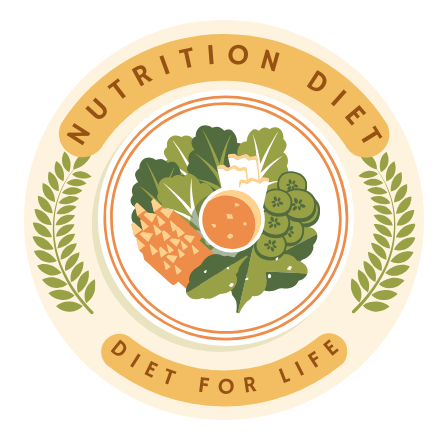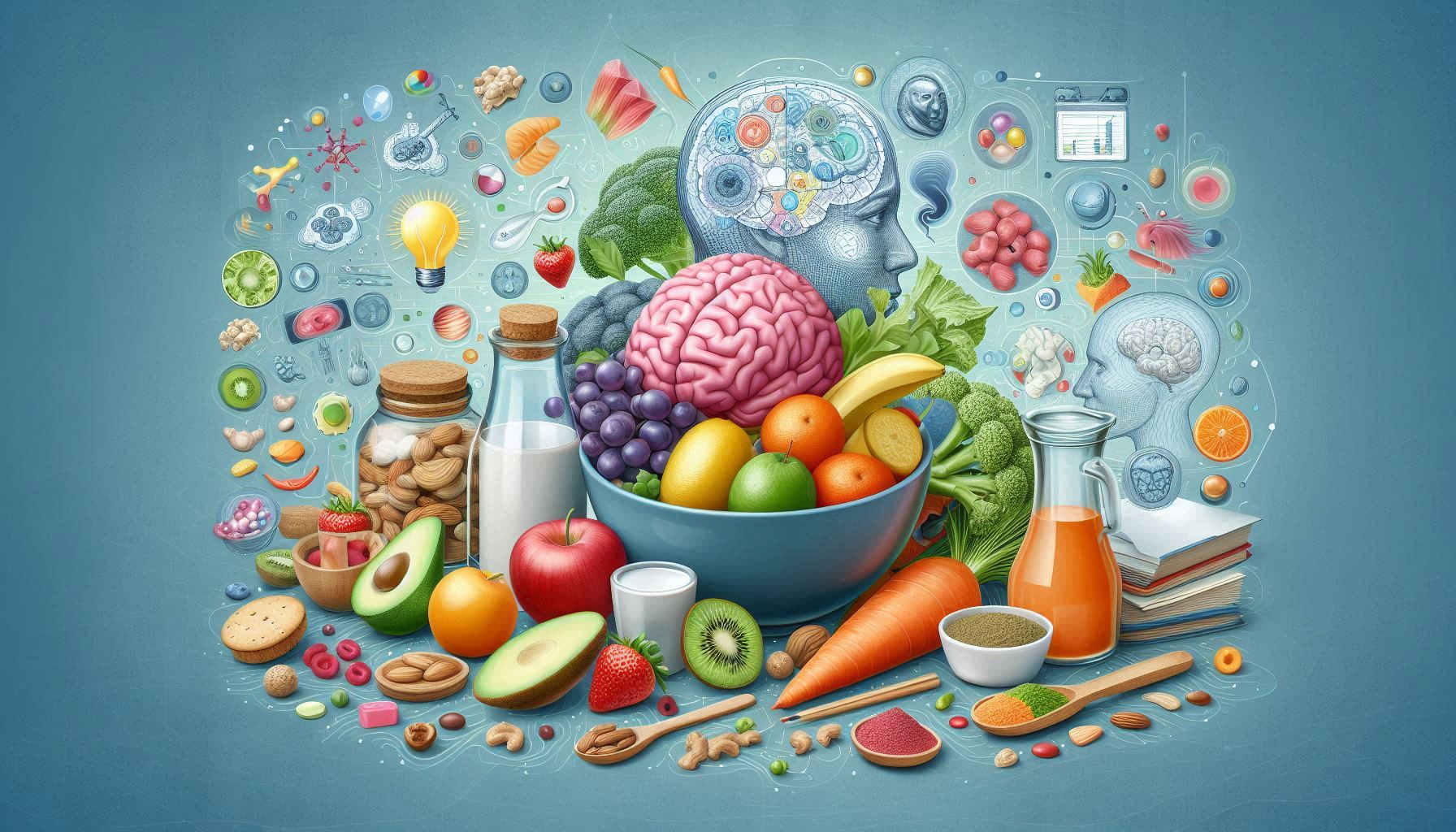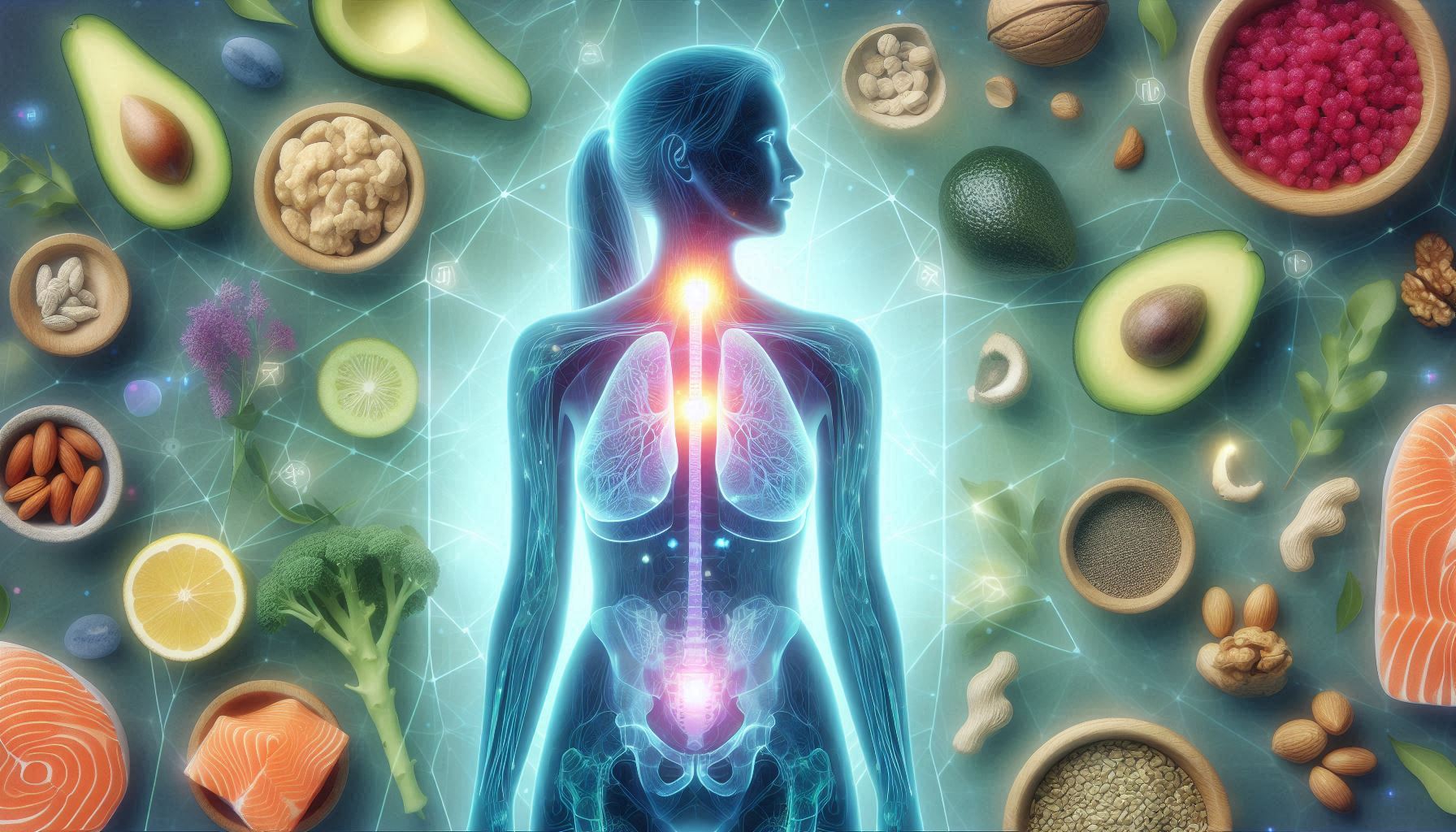Introduction
Mental health is a complex and multifaceted aspect of well-being, shaped by various factors such as genetics, environment, and lifestyle. Among these, nutrition plays a crucial yet often overlooked role. The food we consume not only impacts our physical health but also significantly influences our mental health, affecting mood, cognitive function, and overall behavior.
Research has increasingly highlighted the connection between diet and mental health, showing that certain nutrients are essential for supporting brain function and emotional well-being. For instance, omega-3 fatty acids, found in fatty fish and seeds, are known to reduce symptoms of depression and anxiety. B vitamins, especially B6, B12, and folate, play a vital role in neurotransmitter production, which directly impacts mood regulation. Similarly, magnesium, a mineral found in leafy greens and nuts, helps stabilize mood and reduce stress. The gut-brain axis, the link between gut health and mental function, is another important factor in this relationship. A balanced microbiome, supported by probiotics and fiber-rich foods, contributes to improved cognitive function and emotional resilience. Antioxidants like vitamin C and vitamin E, present in fruits and vegetables, protect brain cells from oxidative damage, promoting better brain health.
Dietary patterns also matter, with research showing that balanced diets, such as the Mediterranean diet, which emphasizes whole foods, healthy fats, and plant-based ingredients, can reduce the risk of depression and cognitive decline. Incorporating these nutrients into your daily diet through whole, nutrient-dense foods can have a profound impact on mental well-being, enhancing mood and cognitive function. By prioritizing nutrition, we can take proactive steps to support both our brain and emotional health.
Understanding the Brain-Gut Connection
The brain and gut are intricately connected through the gut-brain axis, a communication pathway linking the gastrointestinal system to the central nervous system. This axis enables direct communication between the brain and the gut, making the gut sometimes referred to as the “second brain” due to its vast network of neurons.
Key concepts:
- Neurotransmitters: The gut produces over 90% of the body’s serotonin, a neurotransmitter that regulates mood, sleep, and digestion. Disruptions in serotonin production within the gut can have significant effects on mental health, leading to issues such as anxiety, depression, and other mood disorders. The gut’s role in serotonin production underscores its importance in emotional well-being.
- Microbiome: The gut is home to trillions of microorganisms, collectively known as the microbiome. These microbes have a profound influence on brain function and mental health. A healthy and balanced microbiome can improve cognitive performance, enhance emotional regulation, and protect against mood disorders like depression. Conversely, an imbalanced microbiome has been linked to cognitive decline and mental health issues.
- Inflammation: Chronic gut inflammation can extend to the brain, leading to brain inflammation. This inflammation has been associated with various mental health conditions, including depression and anxiety. When the gut is inflamed, it can produce signals that affect the brain, contributing to emotional dysregulation and cognitive dysfunction.
Gut Health and Mood:
- A balanced gut microbiome supports the production of essential neurotransmitters like serotonin, dopamine, and gamma-aminobutyric acid (GABA), all of which play a role in mood regulation and cognitive function.
- The gut also produces short-chain fatty acids (SCFAs) from fiber that have neuroprotective effects, reducing the risk of neurodegenerative diseases like Alzheimer’s.
Essential Nutrients for Mental Health
Omega-3 Fatty Acids: Foundational Support for Brain Function
Omega-3 fatty acids are polyunsaturated fats that are crucial for brain health. They play an integral role in the structure and function of brain cells. Omega-3s are particularly known for their anti-inflammatory effects, which are essential for brain health and the prevention of neurodegenerative diseases.
Role in Mental Health:
- Mood regulation: Omega-3s have been shown to reduce symptoms of depression and anxiety. They help to stabilize mood by regulating neurotransmitter activity and improving brain plasticity, which is essential for emotional resilience.
- Cognitive function: Omega-3s support memory, learning, and overall cognitive performance by enhancing communication between brain cells.
- Sources: Fatty fish (salmon, mackerel, sardines), flaxseeds, chia seeds, walnuts, and algae-based supplements.
B Vitamins: Building Blocks for Neurotransmitter Synthesis
B vitamins, especially B6, B12, and folate (B9), are essential for brain function and mood regulation. They are involved in the production of neurotransmitters like serotonin, dopamine, and GABA, which directly affect mood and emotional well-being.
Role in Mental Health:
- Mood stabilization: B vitamins help regulate mood by influencing the production of serotonin and other mood-regulating chemicals.
- Cognitive health: Vitamin B12 and folate are particularly important for the synthesis of red blood cells and maintaining nerve health, protecting against cognitive decline.
- Sources: Leafy greens, legumes, eggs, meat, dairy, and fortified cereals.
Vitamin D: The Sunshine Vitamin for Mental Health
Vitamin D is not just important for bone health; it also plays a crucial role in brain function and emotional regulation. It influences the production of serotonin and helps regulate the immune system.
Role in Mental Health:
- Depression prevention: Low levels of vitamin D have been associated with an increased risk of depression and anxiety. Vitamin D receptors are located in areas of the brain involved in mood regulation.
- Seasonal Affective Disorder (SAD): Lack of sunlight during winter months can lead to vitamin D deficiency, triggering symptoms of SAD.
- Sources: Sunlight, fortified dairy products, fatty fish, egg yolks, and mushrooms.
Magnesium: The Mood Stabilizer
Magnesium is a vital mineral involved in over 300 biochemical reactions in the body, including energy production, protein synthesis, and nerve transmission. It is often referred to as the body’s “natural antidepressant.”
Role in Mental Health:
- Stress response: Magnesium helps regulate the HPA axis, which governs the body’s response to stress. It also plays a role in relaxing the nervous system, reducing anxiety and promoting restful sleep.
- Mood enhancement: Magnesium deficiency has been linked to symptoms of depression and anxiety. Adequate magnesium levels can enhance mood, improve sleep, and reduce stress.
- Sources: Leafy greens, nuts, seeds, legumes, and whole grains.
The Role of Antioxidants in Mental Health
The brain is highly vulnerable to oxidative stress, which occurs when free radicals damage brain cells. This oxidative damage can contribute to cognitive decline and mental health disorders. Antioxidants are vital in neutralizing free radicals and protecting the brain from oxidative stress, supporting both brain function and emotional well-being.
Key antioxidants for mental health:
- Vitamin C: A powerful antioxidant, vitamin C helps shield the brain from oxidative damage. It is involved in the synthesis of essential neurotransmitters, such as serotonin and dopamine, which regulate mood and cognitive function. Additionally, vitamin C supports the immune system, contributing to overall health and resilience.
- Vitamin E: Another crucial antioxidant, vitamin E protects brain cells from oxidative damage. Research has shown that vitamin E can improve cognitive function in older adults and may help slow the progression of neurodegenerative conditions, such as Alzheimer’s disease.
- Polyphenols: Found in foods like berries, dark chocolate, and green tea, polyphenols possess both antioxidant and anti-inflammatory properties. These compounds help protect brain cells from oxidative damage while improving mood and cognitive function. They may also reduce the risk of mental health disorders like depression.
Sources of antioxidants:
To incorporate more antioxidants into your diet, focus on foods such as fruits and vegetables, especially dark leafy greens, berries, and citrus fruits. Other excellent sources include nuts, seeds, dark chocolate, green tea, and olive oil. By eating a variety of these antioxidant-rich foods, you can enhance brain health, protect against oxidative stress, and support better mental well-being.
The Importance of Protein and Amino Acids
Amino acids, the building blocks of proteins, are crucial for producing neurotransmitters like serotonin, dopamine, and norepinephrine, which are responsible for regulating mood, cognition, and overall brain function.
Key amino acids for mental health:
- Tryptophan: As a precursor to serotonin, tryptophan plays a vital role in regulating mood and promoting a sense of well-being. It can help alleviate symptoms of depression and anxiety by supporting balanced serotonin levels.
- Tyrosine: This amino acid is a precursor to dopamine, a neurotransmitter linked to motivation, pleasure, and cognitive function. Adequate tyrosine levels can improve mental clarity, focus, and help combat fatigue.
- Glutamine: Glutamine supports cognitive function and is involved in memory, learning, and overall brain health. It helps maintain mental performance, especially during periods of stress or cognitive strain.
Protein sources:
To ensure an adequate intake of amino acids, focus on high-quality protein sources such as lean meats, poultry, fish, dairy, eggs, tofu, legumes, and quinoa. These foods provide the necessary amino acids that support neurotransmitter production, cognitive health, and emotional well-being.
Incorporating these protein-rich foods into your diet can enhance mood regulation, cognitive function, and mental resilience.
Blood Sugar Regulation and Mental Health
Fluctuations in blood sugar levels can have a significant impact on mood and cognitive function. Blood sugar imbalances can lead to irritability, fatigue, and brain fog, which are often mistaken for mental health disorders.
Blood sugar and mood:
- High-carbohydrate or sugary meals can cause spikes and crashes in blood sugar levels, leading to irritability and energy dips.
- A diet rich in complex carbohydrates (whole grains, legumes, vegetables) helps maintain steady blood sugar levels, preventing mood swings and cognitive decline.
Gut Health and Mental Well-Being: The Role of Probiotics and Prebiotics
The gut microbiome plays a critical role in mental health by influencing inflammation, immune function, and neurotransmitter production.
- Probiotics: These are beneficial bacteria found in fermented foods like yogurt, kefir, and sauerkraut. They help maintain a healthy gut microbiome and have been shown to improve mood and reduce symptoms of anxiety and depression.
- Prebiotics: These are fibers that nourish beneficial gut bacteria. Foods high in prebiotics include onions, garlic, bananas, and whole grains.
The gut-brain connection:
Research suggests that a balanced microbiome can reduce symptoms of depression and anxiety, suggesting a potential avenue for dietary intervention in mental health care.
Hydration and Cognitive Function
Even mild dehydration can have a significant impact on mood, cognition, and physical performance. Since the brain is made up of approximately 75% water, maintaining proper hydration is vital for optimal brain function.
Role in mental health:
- Dehydration can impair cognitive abilities, including concentration, memory, and decision-making. It can also increase feelings of fatigue, irritability, and anxiety, which can negatively affect overall emotional well-being.
- Drinking sufficient water throughout the day is essential for supporting cognitive function. Proper hydration helps maintain focus, clarity of thought, and the ability to process information effectively. Additionally, staying hydrated supports emotional regulation, helping to stabilize mood and reduce stress.
Nutrition and Aging: Preventing Cognitive Decline
As we age, proper nutrition becomes essential for preserving cognitive function and reducing the risk of neurodegenerative diseases like Alzheimer’s and Parkinson’s.
Dietary patterns:
- The Mediterranean diet, which is abundant in antioxidants, omega-3 fatty acids, and fiber, has been consistently linked to improved cognitive function and a lower risk of dementia. This diet emphasizes whole grains, fruits, vegetables, nuts, olive oil, and fatty fish, all of which are rich in nutrients that support brain health and protect against oxidative stress.
- The MIND diet, a combination of the Mediterranean and DASH diets, has been specifically designed to promote brain health. This diet focuses on foods that have been shown to slow cognitive decline, such as leafy greens, berries, whole grains, nuts, and fish, while limiting unhealthy fats and sugars. Studies suggest that following the MIND diet can significantly reduce the risk of Alzheimer’s and improve cognitive function in older adults.
Conclusion
Proper nutrition is essential for mental health, as it directly impacts mood, cognition, and overall well-being. A balanced diet rich in key nutrients such as omega-3 fatty acids, B vitamins, antioxidants, and magnesium plays a vital role in supporting brain function and emotional regulation. These nutrients are crucial for the production of neurotransmitters that regulate mood, enhance cognitive abilities, and help maintain mental clarity.
In addition to these nutrients, other factors such as gut health, blood sugar regulation, and hydration are critical for mental performance. The gut-brain axis, which connects gut health to brain function, underscores the importance of a healthy microbiome in managing mood and cognition. A diet rich in fiber, probiotics, and prebiotics can help support this connection, promoting a more stable emotional state. Maintaining steady blood sugar levels by choosing complex carbohydrates over sugary foods can prevent mood swings and mental fatigue. Proper hydration is also crucial, as even mild dehydration can impair cognitive function, concentration, and memory.
Protein intake is another essential factor for mental health. Proteins provide amino acids, which are the building blocks for neurotransmitters like serotonin and dopamine, responsible for regulating mood and cognitive function.
In summary, while mental health is influenced by a range of factors, nutrition is one of the most accessible and impactful ways to support emotional and cognitive well-being. For individuals facing mental health challenges, adopting a nutrient-dense diet can be a transformative step toward improving mental clarity, reducing anxiety and depression, and fostering emotional balance. By prioritizing nutrition, we can empower ourselves to maintain better mental health.
SOURCES
Alzheimer’s Association. (2022). 2022 Alzheimer’s disease facts and figures. Alzheimer’s & Dementia, 18(4), 700-753.
Berk, M., Williams, L. J., Jacka, F. N., O’Neil, A., Pasco, J. A., & Moor, M. A. (2013). Mental health and the environment: A review of the links between nutrition, diet, and mental health. Australian & New Zealand Journal of Psychiatry, 47(3), 255-265.
Carter, C. S., & Loughnan, S. L. (2020). Omega-3 fatty acids and mental health: A critical review of the literature. Nutrition Research Reviews, 33(2), 116-134.
Davidson, M. R., & Field, M. (2015). The role of B vitamins in mood and cognitive function. Nutrition & Food Science, 45(2), 79-89.
Gómez-Pinilla, F. (2008). Brain foods: The effects of nutrients on brain function. Nature Reviews Neuroscience, 9(7), 568-578.
Graham, J., & Sallis, J. F. (2016). Dietary habits and cognitive function: The role of dietary fats and micronutrients. Nutrients, 8(9), 572-585.
Hibbeln, J. R., & Marchi, A. (2009). Omega-3 fatty acids in depression: A review. Journal of Clinical Psychiatry, 70(4), 543-548.
Jacka, F. N., Pasco, J. A., Williams, L. J., & Berk, M. (2013). Association of Western and traditional diets with depression and anxiety in women. The American Journal of Psychiatry, 170(3), 271-279.
Meyer, B. J., & Woodside, J. V. (2009). A review of the relationship between micronutrients and mental health. Journal of Human Nutrition and Dietetics, 22(5), 421-432.
Mischoulon, D., & Fava, M. (2002). Nutritional influences in mood and anxiety disorders. Psychiatric Clinics of North America, 25(3), 733-748.
Sarris, J., O’Neil, A., & Boyer, W. (2016). Nutritional medicine as mainstream in psychiatry. The Lancet Psychiatry, 3(8), 850-860.
Stevenson, R. J., & Mahmut, M. (2015). The role of diet in the treatment of depression: Evidence and mechanisms. Neuroscience & Biobehavioral Reviews, 55, 111-120.
Vancampfort, D., Knapen, J., & Probst, M. (2015). The role of exercise and diet in the treatment of depression: A critical review. Psychiatric Quarterly, 86(1), 73-80.
Veenhuizen, H. A., & Martin, K. J. (2017). Probiotics, prebiotics, and gut-brain axis: Implications for psychiatric disorders. Frontiers in Psychiatry, 8, 146-153.
Zanini, A., & Borsato, G. (2018). Magnesium and mental health: The role of magnesium in mood disorders and cognitive function. Journal of Affective Disorders, 227, 51-59.
HISTORY
Current Version
November 29, 2024
Written By:
SUMMIYAH MAHMOOD




